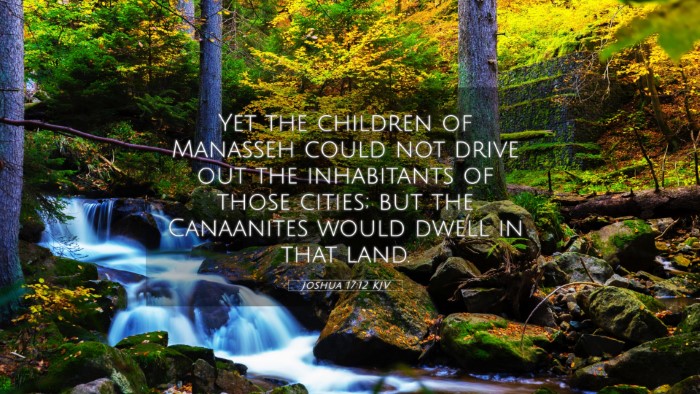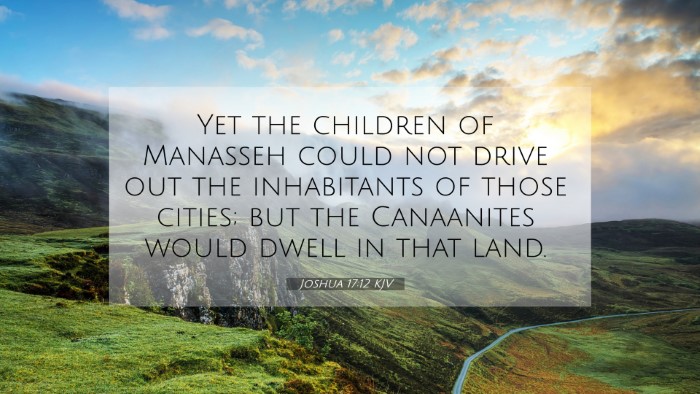Old Testament
Genesis Exodus Leviticus Numbers Deuteronomy Joshua Judges Ruth 1 Samuel 2 Samuel 1 Kings 2 Kings 1 Chronicles 2 Chronicles Ezra Nehemiah Esther Job Psalms Proverbs Ecclesiastes Song of Solomon Isaiah Jeremiah Lamentations Ezekiel Daniel Hosea Joel Amos Obadiah Jonah Micah Nahum Habakkuk Zephaniah Haggai Zechariah MalachiJoshua 17:12 Similar Verses
Joshua 17:12 Cross References
Yet the children of Manasseh could not drive out the inhabitants of those cities; but the Canaanites would dwell in that land.
Uncover the Rich Themes and Topics of This Bible Verse
Listed below are the Bible themes associated with Joshua 17:12. We invite you to explore each theme to gain deeper insights into the Scriptures.
Joshua 17:12 Cross Reference Verses
This section features a detailed cross-reference designed to enrich your understanding of the Scriptures. Below, you will find carefully selected verses that echo the themes and teachings related to Joshua 17:12 KJV. Click on any image to explore detailed analyses of related Bible verses and uncover deeper theological insights.
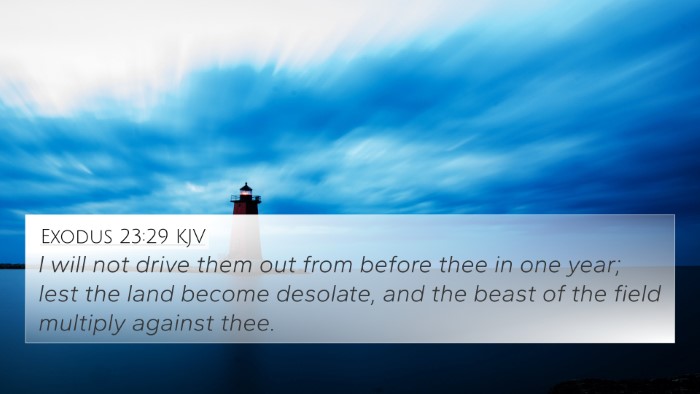
Exodus 23:29 (KJV) »
I will not drive them out from before thee in one year; lest the land become desolate, and the beast of the field multiply against thee.
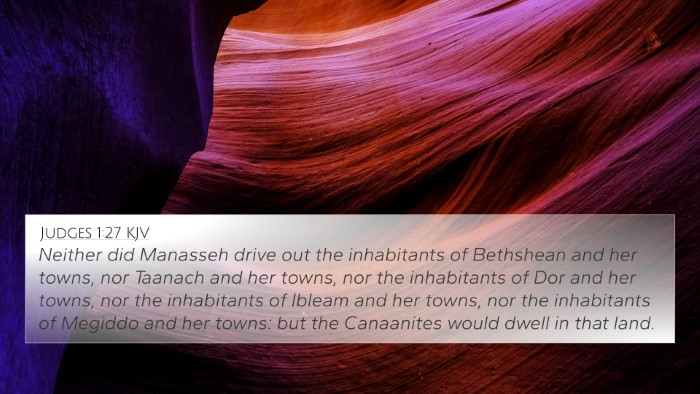
Judges 1:27 (KJV) »
Neither did Manasseh drive out the inhabitants of Bethshean and her towns, nor Taanach and her towns, nor the inhabitants of Dor and her towns, nor the inhabitants of Ibleam and her towns, nor the inhabitants of Megiddo and her towns: but the Canaanites would dwell in that land.
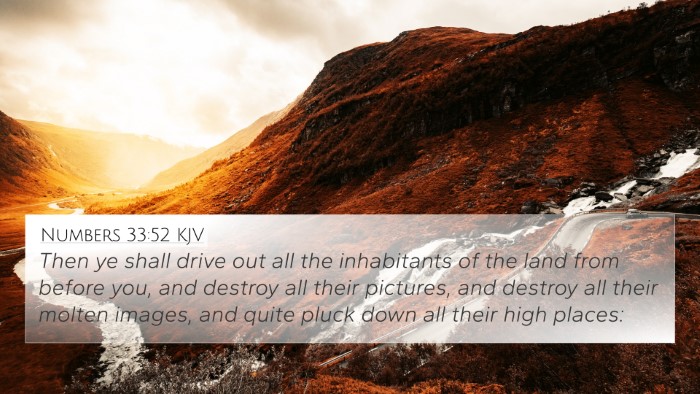
Numbers 33:52 (KJV) »
Then ye shall drive out all the inhabitants of the land from before you, and destroy all their pictures, and destroy all their molten images, and quite pluck down all their high places:
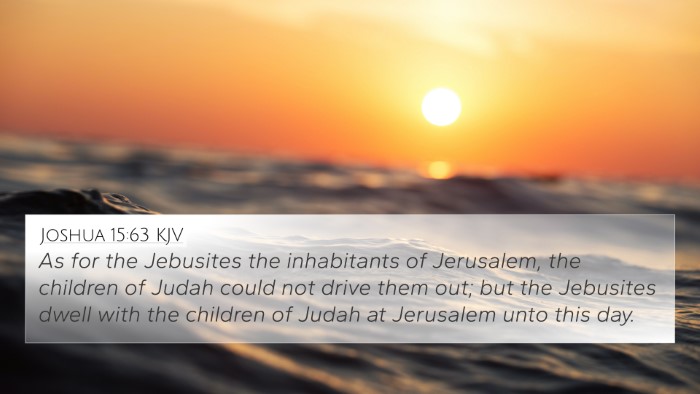
Joshua 15:63 (KJV) »
As for the Jebusites the inhabitants of Jerusalem, the children of Judah could not drive them out; but the Jebusites dwell with the children of Judah at Jerusalem unto this day.
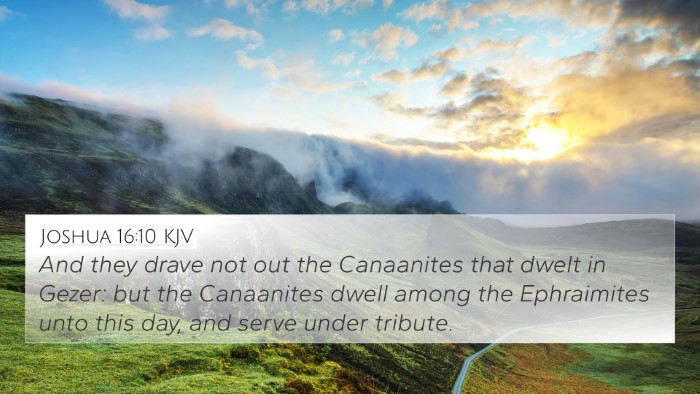
Joshua 16:10 (KJV) »
And they drave not out the Canaanites that dwelt in Gezer: but the Canaanites dwell among the Ephraimites unto this day, and serve under tribute.

Romans 6:12 (KJV) »
Let not sin therefore reign in your mortal body, that ye should obey it in the lusts thereof.
Joshua 17:12 Verse Analysis and Similar Verses
Understanding Joshua 17:12
Verse: "Yet the children of Manasseh could not drive out the inhabitants of those cities; but the Canaanites would dwell in that land." - Joshua 17:12
This verse reflects a significant moment in the history of Israel as they settle in the Promised Land. It captures the challenge faced by the tribe of Manasseh in securing their inheritance. Here is a detailed analysis drawn from respected public domain commentaries.
Context and Overview
The Book of Joshua describes the conquest and distribution of the Promised Land among the Israelite tribes. The tribe of Manasseh, among the last to claim their territory, struggles with fully driving out the Canaanites, a recurring theme throughout the book.
Commentary Insights
Matthew Henry's Commentary
Matthew Henry emphasizes the importance of God’s promises contrasting with human shortcomings. He notes that though Manasseh was a large tribe, they failed to conquer completely. This failure is attributed to a combination of inadequate faith and possibly a desire for comfort, as they allowed the Canaanites to remain. Henry suggests that spiritual laziness can lead to missed opportunities in fulfilling God’s commands.
Albert Barnes' Notes
Barnes focuses on the implications of this partial conquest. He details that the inability of Manasseh to expel the Canaanites serves as a cautionary tale about the consequences of not fully committing to God’s instructions. He connects this struggle with broader themes of compromise that can lead to long-term difficulties for Israel. According to Barnes, the inhabitants that were left could become a snare, hindering Israel's long-term peace and devotion to God.
Adam Clarke's Commentary
Clarke offers a linguistic analysis of the terms used in this passage, noting the significance of the word “could not.” He suggests this indicates lack of determination rather than ability. Clarke also mentions that the phrase suggests a divine will in allowing Canaanites to remain, pointing towards themes of judgment and the necessary consequences of Israel's actions. He posits that God allowed these conditions to test Israel’s faithfulness to Him.
Thematic Connections and Cross-References
Joshua 17:12 is well connected with several other Biblical verses that illustrate the themes of struggle, compromise, and the need for complete obedience to God. Here’s a list of cross-references that deepen our understanding:
- Judges 1:27 - Highlights the failure of the tribe of Manasseh to drive out the inhabitants of Bethshean.
- Deuteronomy 7:2 - Warns the Israelites about making no covenants with the inhabitants of the land, reflecting the disobedience seen in Joshua 17:12.
- Numbers 33:55-56 - Discusses the consequences of allowing foreign nations to remain in their midst, which is echoed in Joshua's narrative.
- 1 Kings 9:21 - Relates to the remnant of Canaanites who continued to dwell in the land, illustrating long-term consequences of Israel's actions.
- Joshua 15:63 - Documents similar failures of the tribe of Judah in driving out the Jebusites, reinforcing the theme of incomplete conquests.
- 2 Samuel 5:6-8 - Reflects on David's eventual confrontation with enemies in the land, stemming from the earlier issues of disobedience.
- Revelation 21:8 - Connects to the idea of judgment upon those who remain unfaithful, illustrating God's eventual justice.
- Isaiah 1:19-20 - Echoes the blessing found in obedience versus the curse in rebellion, relevant to the Israelites' situation.
- Galatians 6:7 - Speaks to the principle that whatever one sows, one will also reap, applicable to the Israelites' compromise.
- Hebrews 4:1-2 - Connects the idea of faith and obedience, crucial for entering into God’s rest, which they ultimately failed to achieve in part.
Conclusion
The analysis of Joshua 17:12 provides valuable insights into the challenges of obedience and the conditions that lead to spiritual victory or defeat. By understanding the struggles of the tribe of Manasseh, we gain perspective on our own spiritual battles, emphasizing the need for full commitment to God’s commands. The interconnectedness of scripture through cross-referencing enriches the study of the Bible and helps illuminate the weight of each verse.
SEO Keywords
This content is optimized with relevant keywords aimed at aiding users searching for connections between Bible verses, including links between the Old and New Testament and comparative Bible verse analyses. These insights equip believers with the tools for deeper study and understanding of God’s word.

